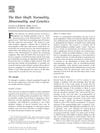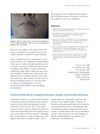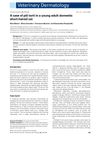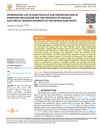 12 citations,
March 1995 in “Journal of the American Chemical Society”
12 citations,
March 1995 in “Journal of the American Chemical Society” Finasteride modifies 5-alpha-reductases through a two-step process, affecting inhibitor potency and possibly causing side effects.
 11 citations,
September 2012 in “The journal of investigative dermatology/Journal of investigative dermatology”
11 citations,
September 2012 in “The journal of investigative dermatology/Journal of investigative dermatology” A mutation in the KRT71 gene causes a hair disorder by disrupting hair follicle structure and texture.
 11 citations,
March 2001 in “Clinics in Dermatology”
11 citations,
March 2001 in “Clinics in Dermatology” Hair microscopy is useful for diagnosing hair disorders, but clear definitions are needed for accurate genetic analysis.
 10 citations,
July 2019 in “Journal of Asia-Pacific Entomology”
10 citations,
July 2019 in “Journal of Asia-Pacific Entomology” Different silkworm varieties have varying nutrient levels in their powders, which may promote hair growth.
 10 citations,
August 2012 in “Current Problems in Pediatric and Adolescent Health Care”
10 citations,
August 2012 in “Current Problems in Pediatric and Adolescent Health Care” Hair changes can indicate systemic diseases or medication effects.
 9 citations,
April 2019 in “Journal of structural biology”
9 citations,
April 2019 in “Journal of structural biology” Hair's internal fibers are arranged in a pattern that doesn't let much water in, and treatments like oils and heat change how much water hair can absorb.
 9 citations,
November 2013 in “Dermatologic Surgery”
9 citations,
November 2013 in “Dermatologic Surgery” Hair transplant complications were likely due to deep graft placement and rough handling.
 8 citations,
November 2022 in “International Journal of Cosmetic Science”
8 citations,
November 2022 in “International Journal of Cosmetic Science” Human hair varies widely and should be classified by curl type rather than race.
 7 citations,
March 2017 in “International Journal of Environmental Research and Public Health”
7 citations,
March 2017 in “International Journal of Environmental Research and Public Health” Breathing in fine particles or Asian dust short-term doesn't affect schoolchildren's skin symptoms.
 7 citations,
November 2013 in “Pediatric and Developmental Pathology”
7 citations,
November 2013 in “Pediatric and Developmental Pathology” Over half of the children had abnormal hair under a microscope, with many having genetic hair conditions.
 7 citations,
November 2013 in “Pediatrics in Review”
7 citations,
November 2013 in “Pediatrics in Review” Acne is a chronic skin condition not caused by poor hygiene or diet, and it requires long-term treatment and patient education.
 7 citations,
December 2008 in “Expert Review of Dermatology”
7 citations,
December 2008 in “Expert Review of Dermatology” The document concludes that various childhood hair and nail disorders exist, some may improve on their own, and advances in genetics and immunology could enhance treatment and counseling.
 7 citations,
April 1987 in “International Journal of Dermatology”
7 citations,
April 1987 in “International Journal of Dermatology” Stopping imipramine reduced the woman's hair loss.
 7 citations,
May 1978 in “International Journal of Dermatology”
7 citations,
May 1978 in “International Journal of Dermatology” Recent hair loss research shows some progress, especially in understanding male pattern baldness, but effective treatments for many types of hair loss are still lacking.
 6 citations,
September 2017 in “Multiple Sclerosis and Related Disorders”
6 citations,
September 2017 in “Multiple Sclerosis and Related Disorders” Nail loss may be a side effect of the MS drug teriflunomide.
 6 citations,
February 2013 in “Veterinary Dermatology”
6 citations,
February 2013 in “Veterinary Dermatology” A young cat had a rare hair condition with twisted hair shafts but stayed healthy.
 6 citations,
July 2003 in “Journal of Womens Health”
6 citations,
July 2003 in “Journal of Womens Health” Experts say proper treatment and sensitivity are important for women's facial skin issues like acne and unwanted hair.
 6 citations,
September 1994 in “Veterinary Clinics of North America: Small Animal Practice”
6 citations,
September 1994 in “Veterinary Clinics of North America: Small Animal Practice” The document concludes that accurate diagnosis is crucial for effectively treating various ear diseases in dogs and cats.
 6 citations,
November 1988 in “Journal of the American Academy of Dermatology”
6 citations,
November 1988 in “Journal of the American Academy of Dermatology” The document concludes that hair analysis is not good for assessing nutrition but can detect long-term heavy metal exposure.
 5 citations,
November 2011 in “Expert Review of Dermatology”
5 citations,
November 2011 in “Expert Review of Dermatology” The document concludes that early diagnosis and a comprehensive treatment plan are crucial for managing hair loss in children, with a focus on both medical and psychological support.
 4 citations,
September 2019 in “Biomedical Papers/Biomedical Papers of the Faculty of Medicine of Palacký University, Olomouc Czech Republic”
4 citations,
September 2019 in “Biomedical Papers/Biomedical Papers of the Faculty of Medicine of Palacký University, Olomouc Czech Republic” CD2 might be a new treatment target for patchy alopecia areata.
 4 citations,
April 2019 in “Cosmetics”
4 citations,
April 2019 in “Cosmetics” Hair stiffness is higher when it has more para-like cortical cells.
 4 citations,
December 2018 in “Macedonian Journal of Chemistry and Chemical Engineering”
4 citations,
December 2018 in “Macedonian Journal of Chemistry and Chemical Engineering” A new method accurately measures amino acids in treated hair, showing bleaching reduces amino acids while protein treatments increase them.
 4 citations,
October 2016
4 citations,
October 2016 Herbs like aloe vera and amla are effective and safe for treating hair loss.
 3 citations,
February 1976 in “Pediatric Clinics of North America”
3 citations,
February 1976 in “Pediatric Clinics of North America” The conclusion is that effective cancer treatment often requires a combination of therapies, but must be carefully managed due to serious side effects and the risk of immunosuppression.
 2 citations,
August 2019 in “Turkish Journal of Chemistry”
2 citations,
August 2019 in “Turkish Journal of Chemistry” Researchers made minoxidil efficiently using cobalt ferrite nanoparticles as a reusable catalyst.
 2 citations,
January 2019 in “Annals of Dermatology”
2 citations,
January 2019 in “Annals of Dermatology” Certain gene variations in EGF and EGFR may increase the risk of alopecia areata in Koreans.
 2 citations,
January 2017 in “Folia biologica”
2 citations,
January 2017 in “Folia biologica” The KRTAP7-1 gene is very similar across different cattle and yak breeds and likely plays a role in hair strength and shape.
 2 citations,
December 2013 in “Veterinary dermatology”
2 citations,
December 2013 in “Veterinary dermatology” Three dogs with a rare skin condition improved with treatment.
 1 citations,
September 2021 in “International journal of research - granthaalayah”
1 citations,
September 2021 in “International journal of research - granthaalayah” Human hair has bipolar electrical charges because of a gap in the hair follicle's electromagnetic field.





























